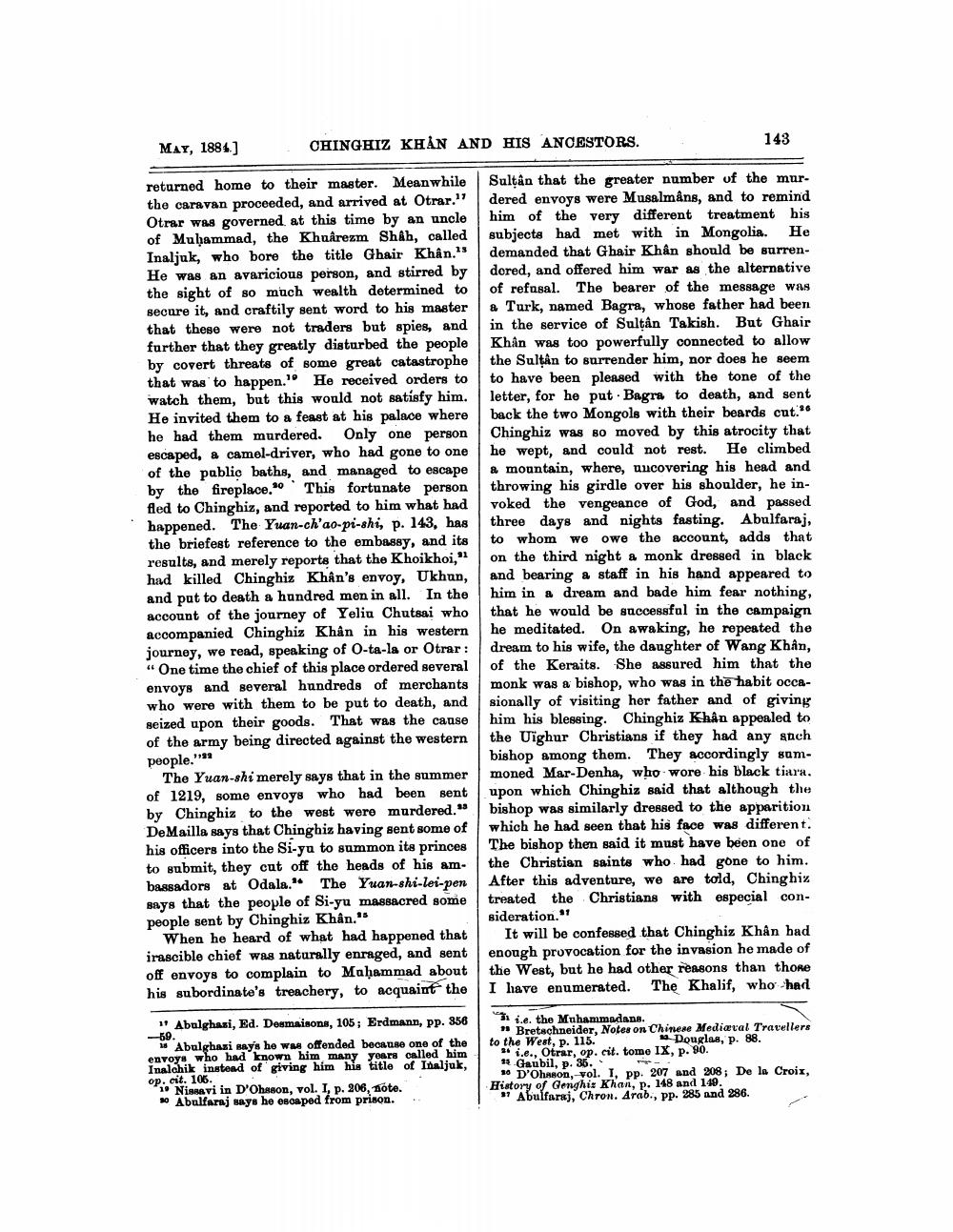________________
CHINGHIZ KHAN AND HIS ANCESTORS.
MAY, 1884.]
returned home to their master. Meanwhile the caravan proceeded, and arrived at Otrar." Otrar was governed at this time by an uncle of Muhammad, the Khuârezm Shah, called Inaljuk, who bore the title Ghair Khân.15 He was an avaricious person, and stirred by the sight of so much wealth determined to secure it, and craftily sent word to his master that these were not traders but spies, and further that they greatly disturbed the people by covert threats of some great catastrophe that was to happen." He received orders to watch them, but this would not satisfy him. He invited them to a feast at his palace where he had them murdered. Only one person escaped, a camel-driver, who had gone to one of the public baths, and managed to escape by the fireplace. This fortunate person fled to Chinghiz, and reported to him what had happened. The Yuan-ch'ao-pi-shi, p. 143, has the briefest reference to the embassy, and its results, and merely reports that the Khoikhoi,"1 had killed Chinghiz Khân's envoy, Ukhun, and put to death a hundred men in all. In the account of the journey of Yeliu Chutsai who accompanied Chinghiz Khân in his western journey, we read, speaking of O-ta-la or Otrar: "One time the chief of this place ordered several envoys and several hundreds of merchants who were with them to be put to death, and seized upon their goods. That was the cause of the army being directed against the western people.'
30
1132
The Yuan-shi merely says that in the summer of 1219, some envoys who had been sent by Chinghiz to the west were murdered. DeMailla says that Chinghiz having sent some of his officers into the Si-yu to summon its princes to submit, they cut off the heads of his ambassadors at Odala." The Yuan-shi-lei-pen says that the people of Si-yu massacred some people sent by Chinghiz Khân."
When he heard of what had happened that irascible chief was naturally enraged, and sent off envoys to complain to Muhammad about his subordinate's treachery, to acquaint the
1 Abulghazi, Ed. Desmaisons, 105; Erdmann, pp. 356
-59.
18 Abulghazi says he was offended because one of the envoys who had known him many years called him Inalchik instead of giving him his title of Inaljuk, op. cit. 105.
19 Nissavi in D'Ohsson, vol. I, p. 206, note. 30 Abulfaraj says he escaped from prison.
143
Sultan that the greater number of the murdered envoys were Musalmâns, and to remind him of the very different treatment his He subjects had met with in Mongolia. demanded that Ghair Khân should be surrendered, and offered him war as the alternative of refusal. The bearer of the message was a Turk, named Bagra, whose father had been in the service of Sultân Takish. But Ghair Khan was too powerfully connected to allow the Sultan to surrender him, nor does he seem to have been pleased with the tone of the letter, for he put Bagra to death, and sent back the two Mongols with their beards cut." Chinghiz was so moved by this atrocity that he wept, and could not rest. He climbed a mountain, where, uncovering his head and throwing his girdle over his shoulder, he invoked the vengeance of God, and passed three days and nights fasting. Abulfaraj, to whom we owe the account, adds that on the third night a monk dressed in black and bearing a staff in his hand appeared to him in a dream and bade him fear nothing, that he would be successful in the campaign he meditated. On awaking, he repeated the dream to his wife, the daughter of Wang Khân, of the Keraits. She assured him that the monk was a bishop, who was in the habit occasionally of visiting her father and of giving him his blessing. Chinghiz Khân appealed to the Uighur Christians if they had any anch bishop among them. They accordingly summoned Mar-Denha, who wore his black tiara. upon which Chinghiz said that although the bishop was similarly dressed to the apparition which he had seen that his face was different. The bishop then said it must have been one of the Christian saints who had gone to him. After this adventure, we are told, Chinghiz treated the Christians with especial consideration."
It will be confessed that Chinghiz Khân had enough provocation for the invasion he made of the West, but he had other reasons than those I have enumerated. The Khalif, who had
i.e. the Muhammadans. "Bretschneider, Notes on Chinese Mediaval Travellers to the West, p. 115. sa Douglas, p. 88. i.e., Otrar, op. cit. tome IX, p. 90. Gaubil, p. 35.
--
30 D'Ohsson, vol. I, pp. 207 and 208; De la Croix, History of Genghis Khan, p. 148 and 149.
7 Abulfaraj, Chron. Arab., pp. 285 and 286.




